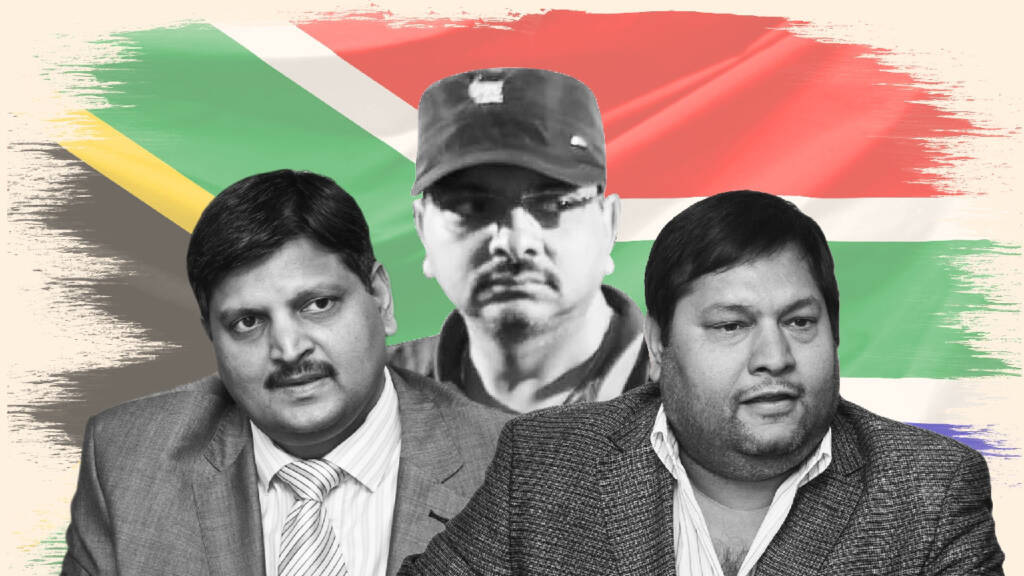There is an old saying, ‘Power corrupts and absolute power corrupts absolutely.’ The story of the rise and fall of the Gupta Brothers in South Africa is a cautionary tale of how power corrupts and ultimately leads to downfall.
The Gupta brothers, sons of a local shopkeeper, had risen almost magically to become one of the richest families in South Africa. However, fate took a dramatic turn for the worse, and now the Guptas are in self-imposed exile as they stand at the center of a scandal that brought down none other than the President of South Africa. Here, we document the saga of the Gupta brothers and the scandal that rocked South Africa.
Who are the Gupta brothers?
The family originally hails from Saharanpur, a city in the Indian state of Uttar Pradesh, and migrated to South Africa in 1993. The prominent members of the family are the three brothers: Ajay, Atul, and Rajesh Gupta.
The Guptas began their journey in South Africa by selling shoes but quickly rose to become central figures in the nation’s post-apartheid history. In 1993, Atul founded Sahara Computers, the family’s first business in South Africa. Today, the Gupta family’s businesses in South Africa include coal mines, computer companies, newspapers, and a media outlet. Overnight, they rose to the ranks of South Africa’s most influential families. According to JSE-listed holdings, Atul Gupta became the seventh-wealthiest person in South Africa in 2016, with an estimated net worth of R10.7 billion (US$773.47 million).
The Scandals
The Guptas have been accused of widespread looting of state funds in South Africa, with their businesses allegedly involved in sweeping corruption that has contributed to the country’s broken economy. According to an investigator, the Guptas had secured at least $3.2 billion worth of business through a vast network of corporations and government connections.
During his appearance before the Zondo Commission, investigator Paul Holden laid out the flow of money from government entities to the Guptas’ money laundering apparatus. Invoices and bank statements show that almost R50bn can be traced, but Holden warned that the true cost to the state is definitely higher.
The Gupta’s Influence on Jacob Zuma
The Guptas first met the then-Vice President Jacob Zuma in 2003. As soon as Zuma became President, Duduzane Zuma, one of Zuma’s sons, became a director in several Gupta-owned firms, while one of Zuma’s daughters was made a director of the Gupta-owned Sahara Computers.
Read More: Will Zuma unseat Ramaphosa?
There are many allegations about the Guptas having influence over appointments to South African Cabinets. Reports suggest that the Guptas tried to influence the appointment of cabinet ministers and were unlawfully awarded state tenders. The most significant allegation is that the then-Deputy Finance Minister, Mcebisi Jonas, was offered the job of Finance Minister and a bribe of 600 million rands. Other allegations exist too. A former ANC MP alleged that the Guptas had offered her a ministerial post in exchange for a business deal.
According to reports, the Guptas recruited other senior ANC officials by giving them secret cuts of lucrative contracts from state utility and rail companies. They acted as fixers for multinational companies, such as the German software giant SAP, which paid them kickbacks in return for government business, as documents show. Furthermore, even in far-flung rural corners of South Africa, they found ANC officials willing to divert money meant to help the poor.
Public officials in South Africa, responsible for various state bodies, say that the Guptas directly instructed them to take decisions that would advance the brothers’ business interests. It is alleged that compliance was rewarded with money and promotion, while disobedience was punished with dismissal. The widespread corruption and looting of state resources caused by the Gupta family’s influence over the government, also known as “state capture,” had a devastating impact on South Africa’s economy.
“Exiled” Gupta brothers
The Gupta brothers have caused not only domestic turmoil and the downfall of the government but have also become the reason for diplomatic tensions between the UAE and South Africa. The fate of the Gupta brothers took a dramatic turn, and the net around them started to tighten. In 2017, several emails showing the extent of the Gupta family’s control over South African politics were leaked. The family fled South Africa in 2018 as huge protests led to the ANC removing Zuma and appointing Cyril Ramaphosa as the acting President.
Read More: South Africa was once counted among top developing economies; Zuma turned it into a mess
Last year, the arrest of the Gupta brothers in Dubai was hailed by many South Africans as a significant moment in the country’s painstaking reckoning with endemic corruption. However, as per a recent report, South African officials are now fuming to learn that a court in the UAE has denied their request to extradite the Gupta brothers. In response, Ronald Lamola, South Africa’s justice minister, accused the United Arab Emirates of failing to uphold a treaty between the two countries.
Not only that, but Africa Intelligence, an online news site, earlier reported that the Guptas had been seen in Switzerland and had applied for asylum in the Central African Republic. According to reports, Michael Hellens, a lawyer for the Guptas, declined to comment on their whereabouts or the extradition case.
Read More: Good News! Cyril Ramaphosa might not run for a second term
The perils of unchecked ambition, further emboldened by a “compliant” President in South Africa, had ultimately resulted in the downfall of Jacob Zuma and the Gupta Brothers. Now, it is even causing diplomatic friction between the UAE and South Africa. Therefore, the saga of the Gupta brothers serves as a lesson for African nations on what not to do with their hard-earned democracy and sovereignty.
https://www.youtube.com/watch?v=n0r_Qi5U7i0
